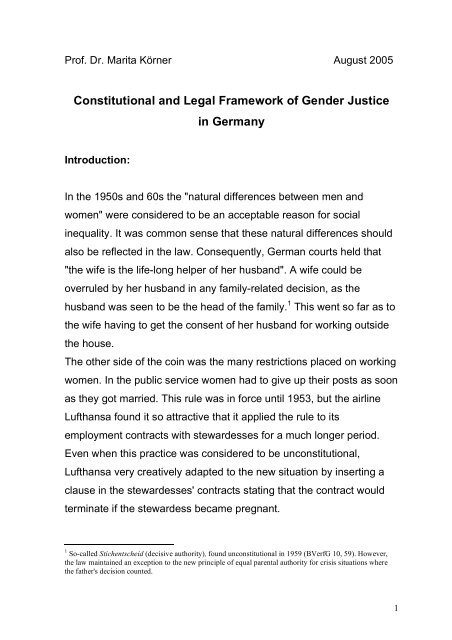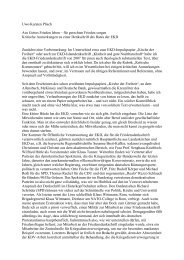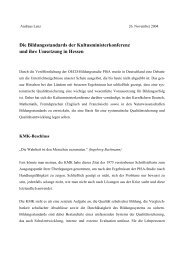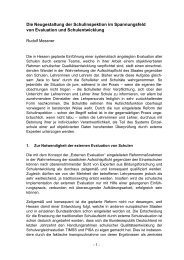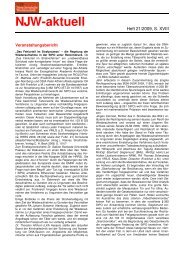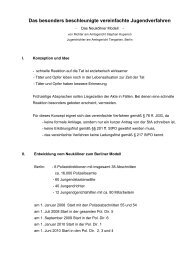Constitutional and Legal Framework of Gender Justice in Germany
Constitutional and Legal Framework of Gender Justice in Germany
Constitutional and Legal Framework of Gender Justice in Germany
You also want an ePaper? Increase the reach of your titles
YUMPU automatically turns print PDFs into web optimized ePapers that Google loves.
Pr<strong>of</strong>. Dr. Marita Körner August 2005<br />
<strong>Constitutional</strong> <strong>and</strong> <strong>Legal</strong> <strong>Framework</strong> <strong>of</strong> <strong>Gender</strong> <strong>Justice</strong><br />
Introduction:<br />
<strong>in</strong> <strong>Germany</strong><br />
In the 1950s <strong>and</strong> 60s the "natural differences between men <strong>and</strong><br />
women" were considered to be an acceptable reason for social<br />
<strong>in</strong>equality. It was common sense that these natural differences should<br />
also be reflected <strong>in</strong> the law. Consequently, German courts held that<br />
"the wife is the life-long helper <strong>of</strong> her husb<strong>and</strong>". A wife could be<br />
overruled by her husb<strong>and</strong> <strong>in</strong> any family-related decision, as the<br />
husb<strong>and</strong> was seen to be the head <strong>of</strong> the family. 1 This went so far as to<br />
the wife hav<strong>in</strong>g to get the consent <strong>of</strong> her husb<strong>and</strong> for work<strong>in</strong>g outside<br />
the house.<br />
The other side <strong>of</strong> the co<strong>in</strong> was the many restrictions placed on work<strong>in</strong>g<br />
women. In the public service women had to give up their posts as soon<br />
as they got married. This rule was <strong>in</strong> force until 1953, but the airl<strong>in</strong>e<br />
Lufthansa found it so attractive that it applied the rule to its<br />
employment contracts with stewardesses for a much longer period.<br />
Even when this practice was considered to be unconstitutional,<br />
Lufthansa very creatively adapted to the new situation by <strong>in</strong>sert<strong>in</strong>g a<br />
clause <strong>in</strong> the stewardesses' contracts stat<strong>in</strong>g that the contract would<br />
term<strong>in</strong>ate if the stewardess became pregnant.<br />
1 So-called Stichentscheid (decisive authority), found unconstitutional <strong>in</strong> 1959 (BVerfG 10, 59). However,<br />
the law ma<strong>in</strong>ta<strong>in</strong>ed an exception to the new pr<strong>in</strong>ciple <strong>of</strong> equal parental authority for crisis situations where<br />
the father's decision counted.<br />
1
Some decades later, times have changed. Nearly every girl <strong>in</strong><br />
<strong>Germany</strong> expects to enter the workforce, more girls than boys f<strong>in</strong>ish<br />
secondary school <strong>and</strong> girls get the better marks. In many subjects,<br />
such as law <strong>and</strong> bus<strong>in</strong>ess adm<strong>in</strong>istration, 50% <strong>of</strong> the university<br />
students are female <strong>and</strong> they graduate with better results.<br />
Nevertheless, women <strong>in</strong> <strong>Germany</strong> still earn 30% less than men <strong>in</strong> the<br />
same type <strong>of</strong> position; women disappear along the career ladder: only<br />
some 10% <strong>of</strong> university pr<strong>of</strong>essors are women <strong>and</strong> woman are seldom<br />
to be found on boards <strong>of</strong> companies. On the other h<strong>and</strong>, 90% <strong>of</strong> part-<br />
time workers are female. Women have the biggest share <strong>of</strong><br />
unprotected, low-paid jobs <strong>and</strong> they are more <strong>of</strong>ten on fixed-term<br />
contracts.<br />
<strong>Legal</strong> framework for <strong>Gender</strong> <strong>Justice</strong><br />
The legal framework <strong>in</strong> <strong>Germany</strong> for creat<strong>in</strong>g gender equality is<br />
threefold:<br />
First <strong>and</strong> foremost is the constitutional level. Here we will have a closer<br />
look at Art. 3 <strong>of</strong> the Basic Law (GG).<br />
Secondly, we have to deal with the European level. It is probably not<br />
an exaggeration to say that without European Community law, <strong>Gender</strong><br />
<strong>Justice</strong> would look very different <strong>in</strong> <strong>Germany</strong>.<br />
Thirdly, there is the general statute law level.<br />
2
A. The Constitution (Basic Law)<br />
Art. 3 guarantees that all persons should be equal before the law.<br />
Paragraph 2 deals specifically with gender equality:<br />
Between 1949, when the Constitution was first enacted, <strong>and</strong> 1994,<br />
Para. 2 only conta<strong>in</strong>ed the first sentence: Men <strong>and</strong> women shall have<br />
equal rights. It was up to the Federal <strong>Constitutional</strong> Court to <strong>in</strong>ject life<br />
<strong>in</strong>to this statement <strong>and</strong> the Court did this accord<strong>in</strong>g to the social values<br />
<strong>and</strong> mores <strong>of</strong> the time. We can dist<strong>in</strong>guish three phases <strong>of</strong> its<br />
jurisprudence:<br />
I. Three phases <strong>of</strong> <strong>in</strong>terpretation <strong>of</strong> Art. 3 para. 2 GG<br />
1. In the first phase, reach<strong>in</strong>g up to the 1960s the Court concentrated<br />
on the biological difference between men <strong>and</strong> women <strong>and</strong> <strong>in</strong>terpreted<br />
the "same status before the law" as a guarantee that the natural<br />
differences should be respected by the law <strong>and</strong> that women should not<br />
have disadvantages due to the "different nature <strong>of</strong> womanhood"<br />
("Andersartigkeit der Frau"). In this phase the Court declared<br />
unconstitutional the family law pr<strong>in</strong>ciple <strong>of</strong> the “supremacy <strong>of</strong> the<br />
husb<strong>and</strong>”.<br />
2. In the second phase - the 1970s <strong>and</strong> early 80s - the Court's<br />
decisions turned to emphasiz<strong>in</strong>g the equality <strong>of</strong> the sexes. The division<br />
<strong>of</strong> roles between women <strong>and</strong> men, which also the Federal<br />
<strong>Constitutional</strong> Court had seen as natural for two decades, was then<br />
regarded as no more than tradition that could no longer be justified<br />
3
under Art. 3 para. 2 <strong>of</strong> the Constitution. In this phase the Court<br />
declared e.g. that "the model <strong>of</strong> the woman, which previously was that<br />
<strong>of</strong> the care-taker <strong>of</strong> the family <strong>and</strong> homemaker, has thoroughly<br />
changed" (1978). 2 It was also <strong>in</strong> this period that the Court found it<br />
unconstitutional that German citizenship was automatically granted to<br />
children <strong>of</strong> German fathers but not to those <strong>of</strong> German mothers<br />
(1974). 3<br />
Many <strong>of</strong> the explicit dist<strong>in</strong>ctions <strong>in</strong> the laws, which were discrim<strong>in</strong>atory<br />
towards women, were erased <strong>in</strong> these years so that the Federal<br />
<strong>Constitutional</strong> Court could readapt its focus <strong>in</strong> the third phase.<br />
3. In this third <strong>and</strong> last<strong>in</strong>g phase - the 1980s <strong>and</strong> onwards - the Federal<br />
<strong>Constitutional</strong> Court began to consider the persist<strong>in</strong>g social dist<strong>in</strong>ctions<br />
between men <strong>and</strong> women.<br />
In recent years the Court has decided e.g. that equality also has to be<br />
guaranteed with respect to the marital name. S<strong>in</strong>ce then spouses have<br />
been able to freely chose a common name or keep their orig<strong>in</strong>al one.<br />
The Court also held (<strong>in</strong> 1992) that (some <strong>of</strong> the) time spent rais<strong>in</strong>g<br />
children has to be recognized as a legitimate contribution to public<br />
retirement <strong>in</strong>surance. 4 Previously, contributions were exclusively l<strong>in</strong>ked<br />
to employment.<br />
In its current phase, the Court has been concentrat<strong>in</strong>g on protective<br />
regulations which <strong>in</strong> reality turn out to be a h<strong>in</strong>drance to women. Let<br />
me mention two key decisions:<br />
2 BVerfGE 48, 327, 338.<br />
3 BVerfGE 37, 217, 250.<br />
4 BVerfGE 87, 1.<br />
4
(1) In 1992 the Court had to decide on the prohibition on women do<strong>in</strong>g<br />
night-time work. The legislature had thought this prohibition protects<br />
women, but the <strong>Constitutional</strong> Court uncovered its discrim<strong>in</strong>atory<br />
aspects. In its decision it held:<br />
"The prohibition on women’s' night work protects many who are also<br />
<strong>in</strong>volved <strong>in</strong> child-care <strong>and</strong> housework from night-time labour which<br />
might threaten their health. This protection, however, is l<strong>in</strong>ked to<br />
considerable disadvantages <strong>in</strong> their search for employment. They<br />
cannot freely chose their work<strong>in</strong>g hours <strong>and</strong> therefore cannot, for<br />
example, earn over-time wages for night labour. The prohibition <strong>of</strong><br />
night-work for women reaffirms the traditional roles <strong>of</strong> the sexes by<br />
assum<strong>in</strong>g that only they have child-care duties. Therefore the<br />
prohibition on night-work for women is an obstacle to the elim<strong>in</strong>ation <strong>of</strong><br />
the social disadvantages from which women suffer und is thus<br />
unconstitutional". 5<br />
(2) Some years later the <strong>Constitutional</strong> Court had to decide on the<br />
prohibition on women work<strong>in</strong>g <strong>in</strong> public fire brigades. The Court held<br />
that this prohibition violated the equal rights guarantee <strong>of</strong> women<br />
because they were treated as the weaker gender without tak<strong>in</strong>g <strong>in</strong>to<br />
account their <strong>in</strong>dividual abilities. 6<br />
II. Affirmative Action?<br />
May I now rem<strong>in</strong>d you <strong>of</strong> the second sentence <strong>of</strong> Art. 3 para 2 <strong>of</strong> the<br />
Basic Law.<br />
5 BVerfGE 85, 191, 209.<br />
6 BVerfGE 92, 91<br />
5
The state shall promote the actual implementation <strong>of</strong> equal rights for<br />
women <strong>and</strong> men <strong>and</strong> take steps to elim<strong>in</strong>ate disadvantages that now<br />
exist.<br />
This 1994 amendment provides for the first time affirmative support for<br />
women. It was the result <strong>of</strong> a constitutional debate follow<strong>in</strong>g German<br />
reunification which considered that social <strong>and</strong> economic equality had<br />
not yet been achieved. There were far-reach<strong>in</strong>g proposals such as:<br />
"the state guarantees the equal status <strong>of</strong> women <strong>in</strong> all areas <strong>of</strong><br />
society" which had no chance <strong>of</strong> be<strong>in</strong>g enacted. The version we have<br />
now is, <strong>of</strong> course, a compromise. However, there is a lot <strong>of</strong> debate<br />
about what the second sentence <strong>in</strong> para. 2 <strong>of</strong> Art. 3 really means.<br />
Even if one sees it as an obligation on the part <strong>of</strong> the state to support<br />
<strong>and</strong> promote gender equality, it is not clear what the state is supposed<br />
or allowed to do. Aga<strong>in</strong>st the background <strong>of</strong> German constitutional<br />
jurisprudence it is considered to be more <strong>of</strong> a programme than a<br />
legally b<strong>in</strong>d<strong>in</strong>g obligation. Nevertheless the Federal <strong>Constitutional</strong><br />
Court decided <strong>in</strong> 2003 that Art. 3 para 2, 2 nd sentence aims at<br />
approximat<strong>in</strong>g the liv<strong>in</strong>g conditions <strong>of</strong> men <strong>and</strong> women <strong>in</strong> order to<br />
grant women <strong>and</strong> men the same chances <strong>in</strong> life.<br />
This provision at least supports affirmative action laws which we have<br />
on the level <strong>of</strong> the Federal States for the public service concern<strong>in</strong>g<br />
access to employment. Some <strong>of</strong> these laws provide that <strong>in</strong> cases <strong>of</strong><br />
comparable qualifications women have to be given preferential<br />
treatment. It is not surpris<strong>in</strong>g that this is a matter <strong>of</strong> ferocious debate<br />
among German lawyers. Some <strong>of</strong> them argue that this type <strong>of</strong><br />
6
egulation discrim<strong>in</strong>ates aga<strong>in</strong>st men which is why the European Court<br />
<strong>of</strong> <strong>Justice</strong> had to deal with it (I'll come back to this po<strong>in</strong>t).<br />
B. European Community Law<br />
Without European law the level <strong>of</strong> gender equality achieved <strong>in</strong><br />
<strong>Germany</strong> would not be what it is now. If one recalls that what today is<br />
the European Union started as a mere economic union, it is at first<br />
glance quite surpris<strong>in</strong>g that this union was concerned with gender<br />
matters at the end <strong>of</strong> the 1950s. The background to this is that one <strong>of</strong><br />
the major found<strong>in</strong>g countries, France, already had, at the national<br />
level, a relatively well-developed anti-discrim<strong>in</strong>atory employment law.<br />
Therefore France thought its companies were at an unfair<br />
disadvantage <strong>in</strong> comparison to companies <strong>in</strong> other member states,<br />
which did not have to comply with any anti-discrim<strong>in</strong>ation legislation.<br />
Consequently France <strong>in</strong>sisted on the <strong>in</strong>sertion <strong>of</strong> an equal pay article<br />
<strong>in</strong> the very first EC Treaty (1957): now Art. 141.<br />
Later on the then European Community passed equal treatment<br />
directives, the most important be<strong>in</strong>g Directive 1976/207 on the<br />
implementation <strong>of</strong> the pr<strong>in</strong>ciple <strong>of</strong> equal treatment for men <strong>and</strong> women<br />
as regards access to employment, vocational tra<strong>in</strong><strong>in</strong>g <strong>and</strong> promotion<br />
<strong>and</strong> work<strong>in</strong>g conditions. This directive was recently amended<br />
(2002/73/EC).<br />
It is also through the 1976-directive that the concept <strong>of</strong> <strong>in</strong>direct<br />
discrim<strong>in</strong>ation has taken root <strong>in</strong> German law. Accord<strong>in</strong>g to this concept<br />
7
discrim<strong>in</strong>ation may also occur if a regulation, which does not exclude<br />
women, nevertheless has more negative effects on them than on men.<br />
One important example <strong>of</strong> <strong>in</strong>direct discrim<strong>in</strong>ation is the different<br />
treatment <strong>of</strong> part-time workers. At first glance this is not discrim<strong>in</strong>atory<br />
as long as all part-timers are treated <strong>in</strong> the same manner, e.g. all are<br />
excluded from company pension schemes. However, if one takes <strong>in</strong>to<br />
account that part-time work is performed ma<strong>in</strong>ly by women, the<br />
discrim<strong>in</strong>atory aspect <strong>of</strong> specific rules for part-timers becomes more<br />
evident.<br />
The <strong>in</strong>direct discrim<strong>in</strong>ation concept <strong>in</strong> EC legislation has also<br />
<strong>in</strong>fluenced the Federal <strong>Constitutional</strong> Court <strong>in</strong> how it <strong>in</strong>terprets the<br />
equal treatment article <strong>in</strong> the German constitution.<br />
Indirect discrim<strong>in</strong>ation is today the most common form <strong>of</strong><br />
discrim<strong>in</strong>ation as the direct forms, i.e. laws that exclude women<br />
expressly, have become rare <strong>in</strong> <strong>Germany</strong>.<br />
Although European law takes priority over domestic legislation,<br />
directives are not always easy to implement <strong>in</strong> the member states. The<br />
ma<strong>in</strong> characteristic <strong>of</strong> directives is that they describe the duties <strong>of</strong> the<br />
member states <strong>and</strong> the aims to be achieved, but leave it to the<br />
member states to choose a form <strong>of</strong> compliance which is <strong>in</strong> keep<strong>in</strong>g<br />
with their own legal system. This means that a directive can be<br />
implemented at a high level <strong>in</strong> one member state <strong>and</strong> at a very low<br />
level <strong>in</strong> another. As far as gender discrim<strong>in</strong>ation is concerned,<br />
<strong>Germany</strong> has tended to belong to the second group <strong>of</strong> countries. It is<br />
then the European Court <strong>of</strong> <strong>Justice</strong> which has to decide if a directive<br />
8
has or has not been implemented properly. The Court has been very<br />
busy with German discrim<strong>in</strong>ation cases <strong>in</strong> the past.<br />
Let me give you a most spectacular <strong>and</strong> very recent example: a young<br />
woman wanted to jo<strong>in</strong> the armed forces but was rejected on the basis<br />
<strong>of</strong> an article <strong>in</strong> the constitution prohibit<strong>in</strong>g women from render<strong>in</strong>g<br />
service <strong>in</strong>volv<strong>in</strong>g the use <strong>of</strong> arms (Art. 12 a GG old version). The<br />
German court deal<strong>in</strong>g with the case, referred it to the European Court<br />
<strong>of</strong> <strong>Justice</strong>, which ruled that the German provision violated the equal<br />
treatment directive <strong>and</strong> had to be changed. It was amended soon<br />
thereafter - the first time ever that an article <strong>of</strong> the constitution has had<br />
to be changed because it contravened European law. Now there is an<br />
<strong>in</strong>creas<strong>in</strong>g number <strong>of</strong> German women serv<strong>in</strong>g <strong>in</strong> the armed forces.<br />
C. Statute law level<br />
This leads us to the third level <strong>of</strong> implement<strong>in</strong>g gender justice, general<br />
(non-constitutional) statute law.<br />
I. Equal Treatment Acts <strong>of</strong> the Federal States<br />
A number <strong>of</strong> public law Equal Treatment Acts have been enacted for<br />
the public service at the level <strong>of</strong> the Federal States. They only b<strong>in</strong>d the<br />
state <strong>in</strong> relation to state employees. As I have already mentioned<br />
some <strong>of</strong> them conta<strong>in</strong> clauses grant<strong>in</strong>g preferential treatment to<br />
women <strong>in</strong> cases where they have the same qualifications as a man. In<br />
three different German cases concern<strong>in</strong>g different Federal State Equal<br />
9
Treatment Acts, the European Court <strong>of</strong> <strong>Justice</strong> had to deal with this<br />
matter. The Court concluded that these clauses may discrim<strong>in</strong>ate<br />
aga<strong>in</strong>st men, but comply with the Equal Treatment Directive as long as<br />
the preferential treatment <strong>of</strong> the women is not automatic <strong>and</strong> the<br />
<strong>in</strong>terests <strong>of</strong> every <strong>in</strong>dividual male applicant are also taken <strong>in</strong>to account.<br />
II. Labour Law<br />
In the private law sector no specific anti-discrim<strong>in</strong>ation provisions have<br />
been enacted so far except <strong>in</strong> the important field <strong>of</strong> labour law.<br />
The European Equal Treatment Directive <strong>of</strong> 1976 was transposed <strong>in</strong>to<br />
German law by add<strong>in</strong>g § 611a to the Civil Code. This key piece <strong>of</strong> anti-<br />
gender discrim<strong>in</strong>ation prohibits gender discrim<strong>in</strong>ation by employers <strong>in</strong><br />
relation to employment contracts, especially as far as access to<br />
employment is concerned.<br />
In the event <strong>of</strong> discrim<strong>in</strong>ation the Directive provides for an efficient<br />
sanction. The German legislature, however, only granted<br />
compensation for the costs <strong>of</strong> apply<strong>in</strong>g for the job, which normally<br />
amounted to the costs for the paper <strong>and</strong> the stamp. The European<br />
Court <strong>of</strong> <strong>Justice</strong> did not accept this as an efficient sanction as required<br />
by the Directive <strong>and</strong> dem<strong>and</strong>ed an amendment <strong>of</strong> the German<br />
provision. Although the Directive dates from 1976, <strong>in</strong> the end it took 22<br />
years (until 1998) <strong>and</strong> three versions <strong>of</strong> § 611a before the Directive<br />
was f<strong>in</strong>ally properly implemented <strong>in</strong> <strong>Germany</strong>.<br />
Nevertheless, there are still three problematic aspects <strong>of</strong> § 611a.<br />
10
The 1 st is the burden <strong>of</strong> pro<strong>of</strong>. Applicants (<strong>of</strong> whom most will be<br />
women) will rarely be <strong>in</strong> a position to obta<strong>in</strong> <strong>in</strong>formation which shows<br />
that they were discrim<strong>in</strong>ated aga<strong>in</strong>st.<br />
The 2 nd difficulty with § 611a is that <strong>in</strong> practice courts only grant small<br />
sums <strong>of</strong> compensation to applicants who have suffered gender<br />
discrim<strong>in</strong>ation.<br />
F<strong>in</strong>ally, § 611a does not give an applicant who has been rejected a<br />
right to be employed, even though this would be the most effective<br />
remedy <strong>in</strong> cases <strong>of</strong> gender discrim<strong>in</strong>ation.<br />
Thus, from an economic perspective it will <strong>of</strong>ten be cheaper for an<br />
employer to ignore § 611a <strong>and</strong> simply pay a small amount <strong>of</strong><br />
compensation to the applicants it rejects.<br />
All the same, the future does not look too bleak.<br />
A new EC <strong>Gender</strong> Directive was passed <strong>in</strong> 2002. It is supposed to<br />
reform the 1976 Directive. Now it is up to <strong>Germany</strong> to implement this<br />
Directive by October 2005.<br />
III. Draft <strong>of</strong> an Anti-Discrim<strong>in</strong>ation Act<br />
The plan <strong>of</strong> the present government was to implement the new<br />
Directive by pass<strong>in</strong>g a separate Anti-Discrim<strong>in</strong>ation Act, which would<br />
also implement one additional directive concern<strong>in</strong>g gender<br />
discrim<strong>in</strong>ation.<br />
So far there is still no Act <strong>in</strong> <strong>Germany</strong> which exclusively deals with<br />
non-discrim<strong>in</strong>ation. However, the far-reach<strong>in</strong>g draft <strong>of</strong> the present<br />
11
government’s Anti-Discrim<strong>in</strong>ation Act no longer has much chance <strong>of</strong><br />
be<strong>in</strong>g enacted due to the political changes expected after the election<br />
<strong>in</strong> September.<br />
Even if this Anti-Discrim<strong>in</strong>ation Act is no longer on the agenda, the<br />
new anti-discrim<strong>in</strong>ation directives have to be implemented somehow.<br />
So let me f<strong>in</strong>ish by just po<strong>in</strong>t<strong>in</strong>g out their most <strong>in</strong>novative aspects<br />
concern<strong>in</strong>g gender justice.<br />
I have mentioned the labour law field where gender justice, <strong>in</strong>itiated by<br />
the European Union, has been on the agenda s<strong>in</strong>ce the 1970s. One <strong>of</strong><br />
the new directives covers this field aga<strong>in</strong> without chang<strong>in</strong>g the<br />
structure <strong>of</strong> the 1976 equal treatment directive.<br />
A second equal treatment directive (2004/113/EC), however, widens<br />
the scope <strong>of</strong> gender justice completely. It is supposed to implement<br />
the pr<strong>in</strong>ciple <strong>of</strong> equal treatment between men <strong>and</strong> women <strong>in</strong> access to<br />
<strong>and</strong> supply <strong>of</strong> goods <strong>and</strong> services <strong>and</strong> <strong>in</strong>surance.<br />
This means that under this directive it is for example very doubtful if<br />
costs for women <strong>in</strong> health <strong>in</strong>surances or private pension funds may be<br />
higher than for men. This is general practice among German <strong>in</strong>surance<br />
companies today – they justify this practice by argu<strong>in</strong>g that women<br />
statistically live longer than men. In a legal context the question is<br />
whether this age difference can be regarded as an objective criterion<br />
justify<strong>in</strong>g the different treatment <strong>of</strong> men <strong>and</strong> women.<br />
Conclusion<br />
12
To sum up we can conclude that it has been a long journey from the<br />
1949 declaration <strong>in</strong> the new German constitution that men <strong>and</strong> women<br />
have equal rights to today's laws <strong>and</strong> jurisprudence that now try to<br />
compensate for structural disadvantages that women encounter.<br />
However, the last step so far, the draft bill <strong>of</strong> the Anti-Discrim<strong>in</strong>ation<br />
Act, shows that gender justice is an ongo<strong>in</strong>g process, even <strong>in</strong> a<br />
country which has been seriously attempt<strong>in</strong>g to make progress <strong>in</strong> this<br />
matter for nearly sixty years.<br />
I would like to f<strong>in</strong>ish with my personal impression which is that th<strong>in</strong>gs<br />
are unfortunately slow<strong>in</strong>g down if not to say go<strong>in</strong>g backwards. On the<br />
one h<strong>and</strong> many young German women no longer feel the need for<br />
further work on equal treatment s<strong>in</strong>ce they never felt discrim<strong>in</strong>ated<br />
aga<strong>in</strong>st at school or university. Thus they th<strong>in</strong>k that equal treatment is<br />
a mission which has been accomplished.<br />
On the other h<strong>and</strong> the difficult economic situation <strong>in</strong> <strong>Germany</strong> is not a<br />
good start<strong>in</strong>g po<strong>in</strong>t for extend<strong>in</strong>g constitutional rights. Particularly <strong>in</strong><br />
this climate, it will be easy for the more conservative political forces to<br />
push gender justice <strong>in</strong>to the background.<br />
13


